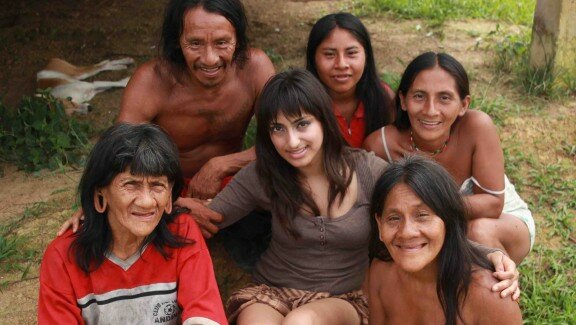Amazon Souls
Sep 10

At the age of 21, Sarah Begum realized a childhood dream by leaving the UK to live with the Huaorani indigenous tribe deep in the forest of the Ecuadorian Amazon. Sarah immersed herself completely in the Huaorani way of life--hunting, gathering, and even marrying a local warrior. She made a documentary film of her journey called "Amazon Souls," which screened at the Cannes Film Festival for the first time earlier this year.
The Huaorani's ancestral home, Yasuni National Park, is one of the most biodiverse places on Earth. The park is situated at the intersection of the Andes, the Equator, and the Amazon basin, where a stunning variety of birds, amphibians, insects, mammals, and flora converge. Some Huaorani communities welcome travelers, offering guided tours through the forest and a first-hand look into their fascinating way of life.
Begum's film raises awareness around the importance of rainforests and the rich cultures of its peoples. She spoke with us about her life-changing experience with the Huaorani.
Q. What inspired your journey to the Amazon rainforest?
Begum: When I was 9 years old, I learned about deforestation at school and immediately wanted to know more. My curiosity gave birth to a dream and a passion to save the Amazon rainforest.
Then at the age of 21, I was studying filmmaking at Kingston University and I didn't feel like I was getting enough from the course. I was appointed president of the Students in Free Enterprise (SIFE) and asked to come up with ideas for a project. I instantly thought of the Amazon rainforest and my classmates encouraged me to develop the idea.
I gave up my role at SIFE to focus on making my very first film in the rainforest. I poured my savings into the project, got some funding from a couple of private investors, and was awarded the Enterprising Student Award for my idea.
Q: Why did you choose to live with the Huaorani tribe?
Begum: I did a lot of research on tribes and I felt the greatest connection with the Huaorani. Their relationship to jaguars fascinated me as well as their pristine way of life and their status as the fiercest warriors of the Ecuadorian Amazon. I was compelled to find out more about them in person.
Q: What surprised you the most about their way of life?
Begum: I thought it would be how they hunt for food and gather resources–but the thing that surprised me the most is how westernization is affecting their culture.

Q: What are the big issues facing the Huaorani?
Begum: The biggest issue is losing their home and way of life to deforestation and oil exploitation. Recently, President Rafael Correa and the Ecuadorian government abandoned an initiative to keep oil in the ground. Ecuador needed to raise $3.6 billion to prevent drilling for oil in the park. When Correa closed the project, he had only raised $13 million. If this [drilling and deforestation] goes ahead, the Huaorani's way of life will be severely threatened.
Westernization is also a problem. While some young members choose to coexist with the western world, spreading the message about protecting their lands and raising awareness of their culture through eco-tourism, other members have chosen to abandon their culture completely.
Q: How do tourism activities impact the Huaoroni?
Begum: Tourism can have negative as well as positive effects. But ultimately, the Huaorani tribe does rely on ecotourism to sustain the jungle and their existence.
Q: Your documentary film, "Amazon Souls," screened at Cannes earlier this year. When can the public expect to see the film?
Begum: I am hoping to release the film worldwide once a broadcaster decides to take it on. After broadcast, I would like to make it available in many other forms for the public to be able to view and share. Fingers crossed! I also intend to go back to make a sequel, so hopefully with lots of support and backing I can make this happen. It would be great to show the Huaorani "Amazon Souls" in person.
Q: What's the one message you hope to spread?
Begum: We all need to unite as one in order to raise awareness of what is happening in the Amazon rainforest, and in rainforests all over the world. Oil exploitation and deforestation need to end. The rainforest shelters such beauty. The Huaorani are under serious threat--not only of losing their home, but of losing their way of life.
Q: What can people do to help protect the rainforests and the Huaorani way of life?
Begum: People are actually not very far away from the rainforest–-many things we use and eat are from the Amazon. We should be grateful to the Amazon for providing such treats and we can show our appreciation by supporting campaigns that aim to save the Amazon rainforest. We need to come together to raise awareness by spreading the message of its existence, its suffering, encourage support from others and share stories and videos such as "Amazon Souls." People can also help by supporting the Rainforest Alliance and others who aim to protect the Amazon on a daily basis.
***
Inspired to plan your next sustainable trip to the Ecuadorian Amazon? Check out Napo Wildlife Center and Sani Lodge to get started!
This interview was originally posted on the Rainforest Alliance's Frog Blog.


